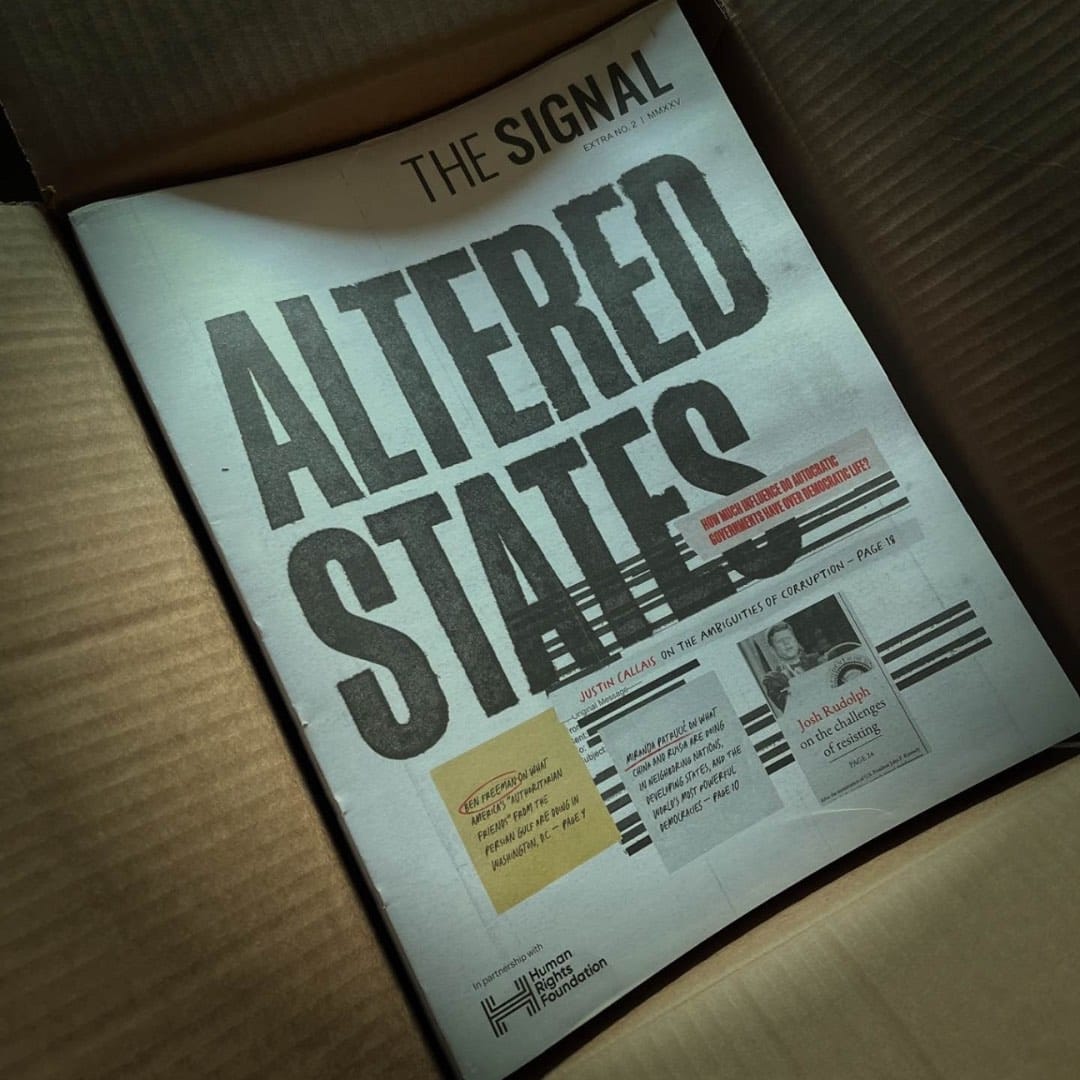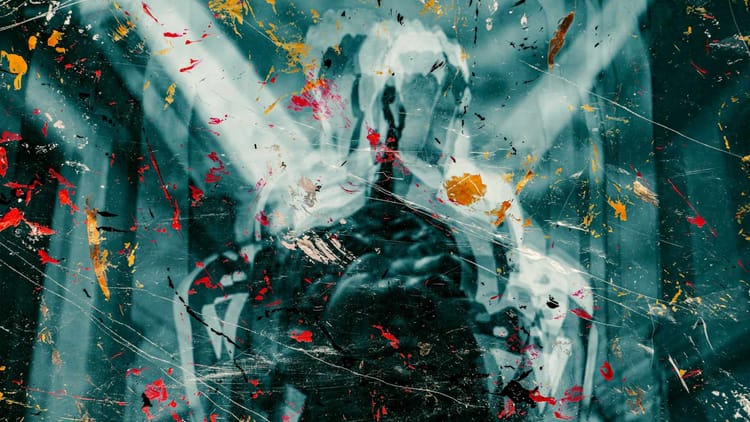Where it leads

Recently: Why is Russia screwing around with GPS navigation on flights across Europe? Darrell Driver on the psychological campaign to change European hearts and minds about Ukraine.
Today: The American political activist Charlie Kirk has been murdered on a Utah campus, with police now questioning a person of interest—extending a recent pattern of U.S. political violence across party lines. Poland and its allies shoot down Russian drones in NATO’s first engagement since the start of the war in Ukraine. A group affiliated with the Islamic State massacres 60 people at a funeral in Congo. & The U.S. Supreme Court has backed the Trump administration’s foreign-aid freeze.
+ Why is France stuck in political crisis? Matthias Matthijs on the increasing political fragmentation across Europe.
& Music from Max Richter ...
Assassination in Utah
Charlie Kirk, the founder of the pro-Trump activist organization Turning Point USA, was shot and killed on Wednesday during an outdoor campus speaking event at Utah Valley University.
Police initially detained an elderly white-haired man, who witnesses said was “screaming about his rights.” Authorities later confirmed that this person is not the shooter and are now questioning a separate person of interest. The shot appears to have been fired from the university’s Losee Center, roughly 200 feet from Kirk’s outdoor speaking area, striking him in the neck.
The assassination of one of the American president’s highest-profile political allies—known as a “Trump whisperer" for his role vetting administration positions—triggered immediate speculation across social media about the shooter’s political motivations, including memes claiming the gunman was a “boomer Democrat,” based on video of the man initially detained by police.
The specter of political violence in America
Kirk’s murder follows a daunting recent trend in the United States. Earlier this year, a man posing as a police officer shot and killed Minnesota state Representative Melissa Hortman along with her husband, Mark, and wounded state Senator John Hoffman with his wife, Yvette, while carrying a list of about 70 intended targets—mostly Democratic politicians but also doctors and Planned Parenthood officials. Also this year, a man set Pennsylvania Governor Josh Shapiro’s house on fire while he and his family slept inside; someone shot and killed two Israeli Embassy workers in Washington, D.C.; and an arsonist firebombed both New Mexico’s Republican Party headquarters and a Tesla dealership.
In 2024, meanwhile, the U.S. Capitol Police recorded more than 9,000 threats against members of Congress, surpassing the previous year’s record and more than doubling the 2017 numbers. Threats against local politicians have also risen significantly from 2022 through 2024, with 170 recorded in the first four months of this year. Meanwhile, surveys show the numbers of Democrats and Republicans who would back violent political action more than doubled between last fall and this May. While a moment like this can feel not just mortifying but ominous, none of it tells us whether things are about to get worse.
- Read Michael Bluhm, “A history of political violence.”
NATO’s first shots
Polish and NATO forces gunned down at least four Russian drones after 19 of them violated Polish airspace during an overnight Russian assault on Ukraine. It’s the first time the alliance has fired on Russian military assets since Moscow’s invasion of 2022.
The incursions penetrated deep enough to force the closure of four airports, including Warsaw’s main hub, and one drone struck a residential building in the village of Wyryki. Polish prosecutors confirmed that at least some of the drones were Gerbera—Russian versions of the Iranian-designed Shahed. According to Ukraine’s President Volodymyr Zelenskyy, at least eight Iranian-made Shahed drones had been “aimed toward Poland.”
The scale and deliberate routing through Belarusian airspace suggest this was not a navigational error but rather Moscow’s most direct test yet of NATO’s eastern boundary—conspicuously as U.S. President Donald Trump has struggled to get any meaningful de-escalation out of Russia’s President Vladimir Putin since their Alaska Summit spectacle of August 15.

A funeral massacre in Congo
Islamic State-affiliated rebels killed at least 60 people with machetes and gunfire Monday night at a funeral ceremony in Ntoyo, North Kivu, in eastern Democratic Republic of Congo. About 10 members of the Allied Democratic Forces (ADF) told mourners to gather in one place before attacking them, according to a survivor who said she “listened to people screaming and fainted.” The majority were killed with machetes, while others were shot, local officials say.
The ADF, which pledged allegiance to the Islamic State in 2019, has continued attacking civilians despite joint operations by Congo and Uganda to target the group. In July, the group carried out two separate assaults in Congo’s Irumu territory, killing 66 civilians in one instance and 43 worshippers during a nighttime church gathering in another.
With several other conflicts are playing out in Eastern Congo, including ongoing clashes between the Rwanda-backed M23 rebel groups and the central government, the ADF has now—as the UN’s high commissioner for human rights, Volker Türk, puts it—“taken advantage of the security vacuum” in the region, making the plight of Congolese there even more difficult and precarious. Which is saying a great deal.
The power of the purse in Washington
U.S. Chief Justice John Roberts issued an administrative stay on Tuesday, allowing the Trump administration to withhold $4 billion in congressionally approved foreign aid, blocking a lower court ruling that would have required the money to be spent by month’s end. The AIDS Vaccine Advocacy Coalition and Global Health Council had sued over Trump’s freeze of aid for global health and HIV programs as part of his broader dismantling of U.S. foreign-assistance programs.
The case represents a constitutional showdown over what power the American presidency has to refuse expenditures the U.S. Congress has allocated. Federal Judge Amir Ali previously ruled the administration couldn’t withhold the funds without congressional approval, but Trump’s legal team argued the injunction created “a grave and urgent threat to the separation of powers” by preventing the president from conducting foreign policy with “one voice.”
Roberts’s stay responds to the third time since February the Trump administration has asked the Supreme Court to intervene in disputes over its freezing of foreign aid—illustrating a pattern of systematic testing by the administration of the boundaries of its executive power over congressional spending decisions.

Our second limited-run print magazine, Altered States, runs down the question of the influence dictators have over democratic life in the world today.
This edition, produced in partnership with the Human Rights Foundation, features conversations—with Ben Freeman, Miranda Patrucić, Justin Callais, and Josh Rudolph—on how authoritarian states build political influence in the U.S., why dictators keep disrupting so many other countries, why autocratic corruption is such a problem for democratic life, and what democracies can do about it.
Currently available in the U.S.A. To register interest in ordering internationally, or with any questions, please be in touch: concierge@thesgnl.com.
Back to the barricades
More than 175,000 French people came out to protest the government in nationwide demonstrations on September 10. Organizers called the event “Let’s Block Everything (Bloquons Tout), which protesters then did—blocking roads and schools across France. They burned a bus in Rennes and stopped the trains in Toulouse. In Paris, they shut down the Musee d’Orsay. The Interior Ministry recorded more than 800 protests throughout the country—and more than 330 arrests.
The demonstrations had been planned for weeks, but their timing seemed perfect: Two days before, Prime Minister François Bayrou lost a confidence vote in the National Assembly— resoundingly, 364 to 194. The day before the protests, President Emmanuel Macron appointed Sébastien Lecornu, Bayrou’s defense minister and Macron’s protégé, to form a new cabinet, but most analysts gave him little chance of serving a full term.
If confirmed, Lecornu will be the country’s third prime minister in the past year—but parties on the left are already vowing to oppose him, and politicians across the spectrum say they expect early elections. Meanwhile, the country still doesn’t have a budget for next year, and its public debt now exceeds 110 percent of its GDP—the highest level in Europe after Greece and Italy.
What’s going on?
Macron called early elections last summer, but the results left the legislature split among the left, center, and right, and the three blocs agreeing on very little. Just after Bayrou’s appointment last September, Matthias Matthijs, discussed here at The Signal how France’s predicament is becoming increasingly characteristic of Europe as a whole.
The parties of the center-right and center-left that depend on broad ideological coalitions are losing voters to the political fringes, especially to the populist-nationalist right; this fragmentation is making it harder and harder to form governments; and the resulting cabinets are often mismatched and ineffective. All this, Matthijs says, is only stoking the kind of popular dissatisfaction driving the protests in France …
Meanwhile
Read John Jamesen Gould on what’s ahead at The Signal … + Hywel Mills, with an update on our migration to Ghost.
Membership with The Signal means access to a suite of benefits, including: all new articles, our complete archive, our cultural-intelligence briefing, and the member’s despatch—our weekly current-affairs roundup for people who want to keep up with what’s happening in the world and need to spend their time carefully.
It also means playing crucial role in backing a distinctive, independent new enterprise in current-affairs journalism.
‘Non-Eternal Pt. 3’






